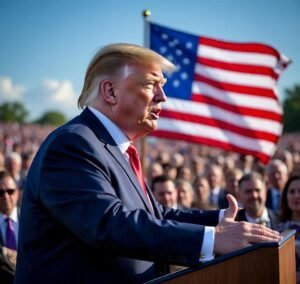In today’s highly polarized political climate, the way presidential power is perceived and portrayed often depends not just on actions, but on who is in office. President Donald J. Trump, for all his controversy, is a leader who uses his power in ways many would never have imagined. Like him or not, he is a force who challenges long-standing norms and expectations, often unapologetically. He doesn’t hesitate to push boundaries, to speak in raw, direct terms, or to wield the office like a weapon in the culture war. That alone makes him one of the most unique and confrontational presidents in American history.
Trump is a president who believes in using the full extent of executive power to accomplish what he sees as promises to the American people. While many view his leadership as authoritarian or reckless, others see it as strong, unrelenting, and purpose-driven. Either way, he makes it clear that he is not interested in playing by the same rules as those who came before him.
Now imagine, for a moment, if former President Barack Obama had acted similarly. Suppose Obama had disregarded institutional norms, lashed out at the media, or aggressively pushed through divisive policies without compromise. Would the media have responded the same way? Would the public? It’s doubtful. Had Obama governed with Trump’s style and tone, he likely would have been met with cries of dictatorship. The scrutiny would have been relentless—not only from the right but also from within his own party and the mainstream press.
This comparison highlights a deep double standard in how American presidents are treated, particularly when race, class, and party are in play. Barack Obama, the first Black president, was often forced to walk a tightrope—balancing his identity with the need to appear “moderate” and “presidential” to a divided nation. Many who once believed in the promise of his presidency now question whether he truly delivered for the people who needed him most.
Some argue that Obama was not a strong leader in the sense that he didn’t fully use the power at his disposal to make transformative change. He was, at times, more concerned with unity and appeasing the political establishment—including powerful figures like the Clintons—than with pushing aggressively for justice, equity, or bold policy reform. Critics believe that he was manipulated by entrenched systems of power, including those influenced by white supremacy, which left his administration achieving less than what many hoped for.
This is not to say Obama didn’t accomplish anything—his presidency brought significant changes, from healthcare reform to the normalization of diplomacy with Cuba. But in the eyes of some, he didn’t go far enough. His style of leadership—calm, deliberate, and measured—was often seen as too soft for the times.
In contrast, Trump operates from a different playbook entirely. He disrupts the system, not by asking permission, but by asserting dominance. For his supporters, this isn’t chaos—it’s strength. It’s a leader finally using presidential power to fight for those who feel forgotten.

Ultimately, the question must be asked: What is the point of being president if you’re not willing to use your power to fulfill your promises? Playing it safe, compromising constantly, or seeking approval from a media machine that often serves elite interests can lead to little more than symbolic victories. Power is only meaningful when used with purpose—and courage.
As America moves forward, it must reckon with these contrasting leadership models. Are we looking for presidents who are cautious caretakers of the system—or leaders who are willing to shake the very foundations of it to get results? And more importantly, are we judging all leaders by the same standards, or are our biases shaping the narrative?
Immigration: A Test of Real Leadership
One of the most pressing issues where the use—or misuse—of power becomes most visible is immigration. The current Trump administration continues to take a hard stance on border enforcement, asylum seekers, and long-settled undocumented immigrants who have lived law-abiding lives in the U.S. for years.
This approach stands in stark contrast to the Democratic Party’s long-standing narrative of advocating for compassionate and humane immigration reform. For years, Democrats have campaigned on promises of creating pathways to citizenship, protecting DREAMers, respecting human rights, and offering dignity to immigrants who contribute to this country in every way except on paper.
But talk is not enough.
Too often, when Democrats gain power, they hesitate to fully use it. Whether due to fear of political backlash, compromise with institutional forces, or the endless push for bipartisanship, the result is the same: millions of immigrants remain in limbo, families continue to be separated, and long-time residents still face deportation and discrimination—despite voting promises and speeches filled with empathy.
The time for symbolic gestures is over. The next time a Democratic president takes office, they must not only speak of justice—they must use their power to the fullest to deliver it. That means pushing real, lasting immigration legislation, creating a functional and fair legal system, and perhaps finally granting amnesty or permanent status to the millions of undocumented immigrants who have worked, paid taxes, and raised families in this country for decades.
If they are not ready to act, then they must stop using immigration as a political tool—something to stir emotion, secure votes, and raise funds—without providing solutions. People’s lives are not bargaining chips. Immigrants are not props. They are part of the American story.
Presidential power is not something to be feared—it is a tool meant to be used with courage and clarity. Whether it’s on economic reform, racial justice, or immigration policy, the real test of leadership is how far someone is willing to go to deliver meaningful results—not just headlines.
The double standards, the empty promises, and the political games must come to an end. America deserves leaders who match their words with action. And the people—immigrants included—deserve to see that leadership used in full.
Samuel Georges
The post A Tale of Two Presidencies: Power, Perception, and the Double Standards in American Politics appeared first on Transparansmm.

